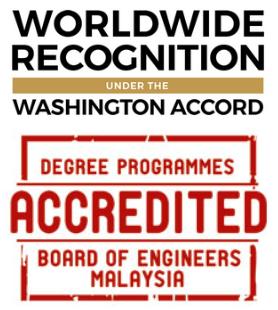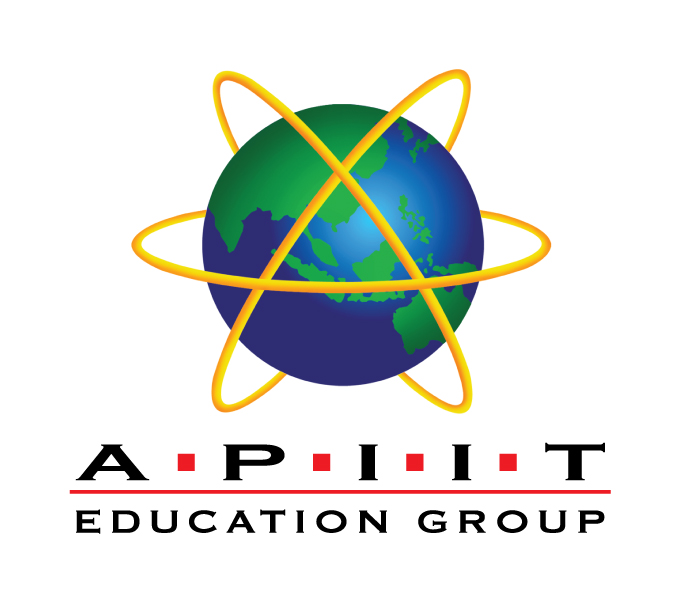-
About APU
Why choose APU?
Malaysia’s Premier Digital Tech UniversityNo.1 for International Students in Malaysia (QS World University Ranking 2025)5-Star Excellence Rating (SETARA)100% Employability RateRanked No.16 for International Students in the WorldMore than 80,000 Graduates & AlumniDual Degree
APU-DMU Dual Degree Programme
Students who are under Bachelor’s Degree Programme will have the option to opt-in for the APU-DMU Dual Degree Scheme. Under this Scheme, students will receive 2 Degree Certificates & Transcripts upon graduation: 1 from Asia Pacific University (APU), Malaysia and 1 from De Montfort University (DMU), UK.Learn MoreAccreditation
More than just a Mechatronic Engineering Degree
APU’s Bachelor of Mechatronic Engineering with Honours degree is designed to provide you an edge with the latest technologies that are in line with the Industrial Revolution 4.0.
Learn More
International Recognition
Engineering Degrees Accredited Under The Washington Accord
APU Engineering Degrees are fully accredited by the Board of Engineers Malaysia (BEM) which is a signatory to the Washington Accord.
This accreditation ensures that APU Engineering Graduates will have the following benefits in countries who are signatories of the Washington Accord:
- Opportunities to register as a Graduate Engineer with Board of Engineers Malaysia (BEM) or the relevant professional bodies in other countries who are signatories under the Washington Accord.
- Pathways to becoming a Professional or Chartered Engineer.
- Assurance that graduates are considered as having met international academic standards for engineering practice.
For more information, please click HERE.
Requirements
Admission Requirements
General RequirementsDirect Entry to Level 1 of the DegreeSTPM- 2 Passes in STPM with a minimum Grade C (GP 2.0) in Mathematics and Physics (or Chemistry), and a Credit in Mathematics and Physics (or Chemistry) at SPM Level or its equivalent.
A-Level- 2 Passes (Grade A-D) in A-Level including Mathematics and Physics (or Chemistry).
UEC- 5 Grade B’s in UEC, including Mathematics and Physics (or Chemistry).
Matriculation/ Foundation- Passed the relevant Foundation programme (minimum CGPA of 2.0) with a Credit in Mathematics and Physics (or Chemistry) at SPM/O-Level/IGCSE or equivalent.
Direct Entry to Level 2 of the DegreeDiploma- Successful completion of the APU/APIIT Engineering Diploma and fulfilment of requirements for Credit Transfer, subject to the approval of the APU Academic Board OR
- Successful completion of a Diploma in Engineering with other recognised Institutions and fulfilment of requirements for Credit Transfer, subject to the approval of the APU Academic Board.
Any qualification that APU accepts as equivalent to the above.Note: The above entry requirements may differ for specific programmes based on the latest programme standards published by Malaysian Qualifications Agency (MQA). The qualification and entry requirements for the programmes will be determined based on the “Comparison List of Equivalency of International Qualifications with SPM (O-Levels equivalent) and STPM (A-Levels equivalent)“ published by Malaysian Qualifications Agency (MQA).Candidates who wish to study Engineering Degree course must not be color blind or physically handicapped which makes him/her unable to conduct experimental/practical work and affect the learning process leading to potential errors towards professional practice as well. This is in line with the requirements of engineering professional bodies where safe engineering practices is mandatory. All International Students need to go through EMGS Medical Screening, if the student is found to be color blind; the Medical Screening maybe failed.
English RequirementsInternational Students- IELTS : 5.0
- TOEFL IBT : 40
- Pearson (PTE) : 47
- MUET : Band 3.5
Engineering @ APUPEO & PLO
-
Programme Educational Objectives
- Be a practicing engineer contributing to the development of Mechatronic Engineering while demonstrating professionalism.
- Pursue engineering innovation via career advancement opportunities and/or advanced studies in Mechatronic Engineering.
Mechatronic Engineering is concerned with the creation, design and building of intelligent machines. This new breed of engineer has to master skills in mechanical, electronic and computer engineering and work in a hybrid manner, meeting an ever-increasing need in industry where complexity of projects is rising and resources are limited. The main areas of activity are:
- Fundamental design and build – ways of embedding intelligence and interfacing to the real world
- Process control – plant condition monitoring and control
- Advance robotics and intelligent Machines
- Image Processing and collision avoidance
- Industrial system such as CIM system, CAD/CAM system
- Design and develop a Mechatronics system
Programme Learning Outcomes
The students, upon completion of their study, should attain the following outcomes:
PLO1 Ability to gain and apply principles of Mathematics, Science and Engineering to the solutions of complex engineering problems. PLO2 Ability to undertake complex engineering problem analysis and apply engineering principles to solve them. PLO3 Ability to design innovative solutions for complex engineering problems. PLO4 Ability to investigate complex engineering problems using research techniques. PLO5 Ability to select and use suitable tools and techniques for complex engineering problems. PLO6 Ability to engage in professional engineering practice for safety, health, social, cultural and legal responsibilities in developing solutions for complex engineering problems. PLO7 Ability to comprehend and demonstrate good practices of engineering in sustainable development and environmental considerations for the solutions of complex engineering problems. PLO8 Ability to execute the responsibilities of an Engineer professionally and ethically. PLO9 Ability to function effectively as a team leader or a member in a team within multi-disciplinary settings. PLO10 Ability to communicate effectively and professionally on complex engineering activities. PLO11 Ability to demonstrate entrepreneurship skills, engineering project management and economic decision making in multidisciplinary environments. PLO12 Ability to recognise the need for, and be able to engage in independent and life-long learning towards continuous professional development. Programme OutlineWhat We Teach
This programme is specifically designed to provide students with:
- High-quality undergraduate engineering education by providing students with a curriculum that is firmly grounded in Mechatronic engineering fundamentals.
- A study of basic engineering sciences and fundamentals of mechanical, electrical, electronics and computer engineering. Students will be able to integrate these four disciplines.
- The technical skills to design, analyse and test “intelligent” products or processes that incorporate suitable controller, sensor and mechatronic devices for robotics and automation.
-
Degree Level 1
Students will understand the basic principles of engineering in the areas of Circuit Analysis, Engineering Materials, Instrumentation & Measurement and Engineering Design. Other modules aim to provide the basic academic skills required to meet the demands of employers, as well as thorough grounding in principles of IT and entrepreneurship. Important and relevant skills for managing activities and for their own independent learning are also introduced.
Common Modules
- Analysis of Circuits
- Instrumentation & Measurement
- Fundamentals of Entrepreneurship
- Engineering Mathematics 1
- Engineering Mathematics 2
- Introduction to C Programming
- Programming with Python
- Engineering Materials
- Engineering Design
- Engineering Statics & Dynamics
Degree Level 2
Here, students start specialising in modules that develop the necessary underlying knowledge and skills in Mechatronic Engineering with modules such as Analogue Electronics, Digital Electronics, Introduction to Electrical Systems, Electromagnetic Field Theory, Engineering Software & Applications, Signals and Linear Systems, Strength of Materials, Robotics Technology and Sensor & Actuators. Engineering Mathematics is provided for the better understanding of the engineering modules.
Common Modules
- Analogue Electronics
- Digital Electronics
- Introduction to Electrical Systems
- Engineering Mathematics 3
- Electromagnetic Field Theory
- Engineering Software & Applications
- Signals and Linear Systems
- Innovation Processes
Specialised Modules
- Fluid Mechanics
- Thermodynamics and Heat Transfer
- Sensors & Actuators
Degree Level 3
Specialised knowledge and skills in the areas of Control Engineering, Communication Engineering Principles, Microprocessor Systems & Embedded Software, Machine Design, Fluid Mechanics, Industrial Automation and Machine Vision & Intelligence are the critical focus of this level. This is a further development of the ability to apply relevant engineering skills with strong critical thinking and analysis. Independent learning continues in all modules
Common Modules
- Control Engineering
- Communication Engineering Principles
- Engineering Mathematics 4
- Microprocessor Systems & Embedded Software
- Engineering Project Management
- Venture Building
Specialised Modules
- Mechanics of Machines
- Industrial Automation
- Robotics Technology
In the 2nd Semester of Year 3 Minor/ Extension Pathway (Choose 1)
- Choose 1 module from Minor Pathway OR Extension Pathway as described in the table below.
Internship (16 Weeks)
Students will undertake an Internship/Industrial Training for a minimum period of 16 weeks to prepare them for a smooth transition from the classroom to the working environment.
Degree Level 4
The final year Engineering modules provide the necessary industry application and technological skills which become very useful for employment upon graduation. Students’ personal and professional development, technical capability and understanding of how to innovate, generate and manage the creation of new ideas will be enhanced. Students will deliver several Engineering Projects where they will demonstrate higher level critical thinking, analysis and solutions development skills which will enhance their employability.
Common Modules
- Project Phase 1 (Investigation)
- Group Design Project 1
- Project Phase 2 (Implementation)
- Engineer in Society
- Group Design Project 2
Specialised Modules
- CAD/ CAM
Minor/Extension Pathway (Continuation)
- Choose 1 module from Minor Pathway OR Extension Pathway as a continuation from the module selected in Year 3 Semester 2 as described in the table below.
Mechatronic Engineering Minor/Extension Pathways
Future Proof Engineers for the Real World
In APU, employment and it’s continual sustainability is of paramount importance to us. The range of minor and extensions offered to all students within the School of Engineering will craft a formidable way forward for the young aspiring engineers of tomorrow. These options allow students to embark on a journey of exploration either within the engineering fraternity by extending into greater depth (extensions) niche knowledge, skills and attributes required for the practice of contemporary engineering or explore wider options (minor) that are pivotal in the fundamental proliferation of the engineering profession as a while when coupled with other current multidisciplinary fields of expertise. Successful completion of either pathways future proof the students allowing them to embark on a journey of rewarding careers within an engineering discipline of their choice.
Minor Pathway – Gain breadth of knowledge by taking 3 set modules outside of a particular major field of study. There are minor packages available undertaken from Year 3 Semester 2 Year 4 Semester 1 and Year 4 Semester 2.
MINOR PATHWAY
NAME OF MINOR Year 3 Semester 2 Year 4 Semester 1 Year 4 Semester 2 loT Knowledge Discovery and Big Data Analytics Internet of Things: Concepts and Applications Emergent Technology FinTech FinTech Governance, Risk Management & Compliance Digital Finance Robo Advisor Digital Transformation Digital Execution Digital Strategy & Analytics Emergent Technology Data Analytics Knowledge Discovery and Big Data Analytics Behavioral Science and Marketing Analytics Optimization & Deep Learning Artificial Intelligence Machine Vision Intelligence (MVI) Text Analysis & Sentiment Analysis Emergent Technology Digital Age Psychology Industrial & Organizational Psychology Cyberpsychology Human Factors Psychology Extension Pathway – Expand depth of knowledge by taking three (3) set modules in a specific area within a certain field of study. There are extensions available undertaken from Year 3 Semester 2, Year 4 Semester 1 and Year 4 Semester 2.
EXTENSION PATHWAY
NAME OF EXTENSION Year 3 Semester 2 Year 4 Semester 1 Year 4 Semester 2 Unmanned Aerial
VehiclesMachine Vision Intelligence Robot Operating Systems Drone Technology Drilling Technology Drilling Fluids & Hydraulics Directional Drilling & Surveying Well Control Oil and Gas Operations Gas Engineering Petroleum Economics Drilling Fluids & Hydraulics Smart Robotics Machine Vision Intelligence Robot Operating Systems Product Creation
TechnologyMQA Compulsory Subjects*
- Appreciation of Ethics and Civilisation (M’sian Students)
- Malay Communication Language (Int’l Students)
- Philosophy and Current Issues
- Workplace Professional Skills
- Integrity and Anti-corruption
- Co-Curriculum
(*All students are required to successfully complete these modules as stipulated by the Malaysian Qualification Agency.)
-
Countries
-
Universities
-
Courses
-
Exams
-
Resources
-
Services
















